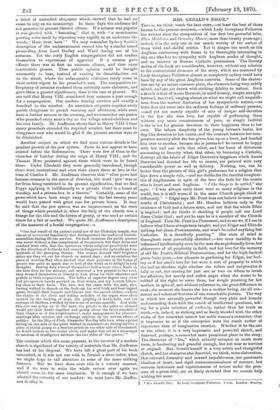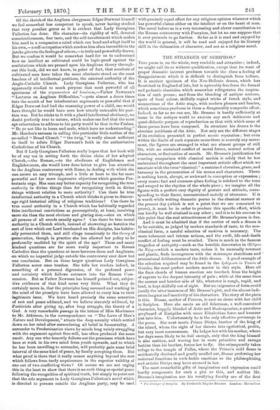MRS. GERALD'S NIECE.* Tars is, we think, much the best
story,—at least the best of those known to the present reviewer,—which Lady Georgians Fullerton has written since the composition of her first two powerful tales,
Ellen Middleton and Grantky Manor, more than twenty years ago ; indeed, it is the only one to our minds worthy of the author of those vivid and skilful stories. Yet it hinges too much on the Anglican controversy with Rome to be thoroughly interesting to any one who has no sympathy with Anglican modes of thought,
and no interest in Roman Catholic pretensions. The literary merits of the book are considerable, however, without any relation
to the controversial elements of the story, which are mastered by Lady Georgiana Fullerton almost as completely as they could have been by any of the great Anglican converts. Some of the charac- ters are by no means common-place, the elements being very subtly mixed, and are yet drawn with striking fidelity to nature. Such a sketch is that of Annie Derwent, in mind homely, simple, straight- forward, reserved, verging almost on what we might call ungainli- ness, from the narrow limitation of her sympathetic nature,—so little does she enter into the ordinary feelings of ordinary persons, —and yet not merely capable of acts of unique self-devotion to the few she does love, but capable of performing them without any acute consciousness of pain, so simply faithful is she in her far greater devotion to their happiness than to her own. The inborn simplicity of the young heiress's tastes, her dog-like devotion to her cousin, and the contrast between her com- parative serenity after she has given him up as a lover, and handed him over to another, because she is persuaded he cannot be happy with her and can with that other, and her burst of bitterness amounting to ferocity when that other, by becoming a Catholic, destroys all the fabric of Edgar Derwent's happiness which Annie Derwent had devoted her life to ensure, are painted with very considerable power as well as delicacy. Nothing, too, can be better than the picture of this girl's preference for a religion that lays down a simple rule, —and her dislike for the fanciful complexi- ties of Anglicanism in spite of the love she feels for the cousin who is heart and soul Anglican. "I like things to be settled," she says ; I was always sorry there were so many religions in the world, but it is still worse if in the same Church people think so differently." "Edgar says Mr. Pratt does not believe in some great truths of Christianity ; and Mr. Hendon believes only in the existence of God and a future state, and not that the whole Bible is inspired ; and .he thinks it shocking if people call our Lord Jesus Christ God ; and yet he says he is a member of the Church of England. Then Mr. Pratt is a Protestant, and so are we, if Jam to believe what I have always been taught; and yet Edgar and Eliza do nothing but abuse Protestantism, and won't be called anything but Catholics. It is dreadfully puzzling." Her state of mind is throughout most powerfully sketched ;—her utter inability to be influenced intellectually even by the man she so profoundly loves, her abhorrence of all perplexity in faith, and her love for the memory of old Mr. Pratt's Biblical Protestantism, and for the high-backed green-baize pews,--her pleasure in gardening for Edgar, her feel- ing as if her aunt's love for her were a sort of property to which she had an absolute right whether she values and reciprocates it fully or not, her craving for just one or two on whom to lavish her affection, her moody and sullen anger when she seems to be robbed of her right to serve them, her simple yearning for her mother, in spite of, and without reference to, the great difference in rank, the moment she knows she has a mother living, are all con- sistent and coherent features of one remarkable picture. The way in which her naturally powerful though very plain and homely understanding deals with the outside of intellectual questions, ask- ing for a. plain criterion of authority, rather than for truth as truth,—is, indeed, so striking and so finely blended with the other traits of her somewhat narrow but noble woman's character, that it impresses us as if the conception were the result rather of experience than of imaginative creation. Whether it be the one or the other, it is a very impressive and powerful sketch, and deserved, perhaps, a somewhat more prominent place in the story. The character of "Ita," which actually occupies so much more room, is fascinating and graceful enough, but not near so nervous or original. Mrs. Gerald herself is a very subtle and thoughtful sketch, and her character also deserved, we think, more elaboration. Her outward formality and inward impulsiveness, her passionate idealism of heart, and rigid commonsensicalness of manner, her nervous indecision and capriciousness of action under the pres- sure of a great trial, are so finely sketched that we cannot help wishing for more.
• Mrs Gerald's Niece, By Lady Georgiana Fullertou. 3 vols. London: Bentley. Of the sketch of the Anglican clergyman Edgar Derwent himself we feel somewhat less competent to speak, never having studied that very peculiar genus as it is evident that Lady Georgiana Fullerton has done. His character—its rigidity of will, devoted -conscientiousness, fine taste, and the self-involvement which makes him need in a companion a mind which can bend and adapt itself to his own, —a self-occupation which renders him of ten insensible to the jars he gives to the feelings of others,—is truly and powerfullydrawn. But we confess it would be somewhat hard for us to understand how an intellect so cultivated could be logic-proof against the oonfutations which are pressed upon his Anglican theory through- out this book, did we not know, in point of fact, that numbers of -cultivated men have taken the same obstinate stand on the most baseless of all intellectual positions, the external authority of the Anglo-Catholic Church. Lady Georgiana Fullerton, who has apparently studied to much purpose that most powerful of all specimens of the argumentum ad hominem,—Father Newman's 41 Lectures on Anglican Difficulties,"—puts almost a dozen times into the mouth of her interlocutors arguments so powerful that if Edgar Derwetrt had had the reasoning power of a child, one would have thought he would have seen bow utterly untenable his posi- tion was. But he sticks to it with a placid intellectual obstinacy, no -doubt perfectly true to nature, which makes one feel that the most apt exhortation to address to his party would be that in the Psalms, 4' Be ye not like to horse and mule, which have no understanding." Mr. Hendon's sarcasm in calling this particular little section of the so-called "Broad Church" "the twig," is really almost sufficient in itself to refute Edgar Derwent's faith in the authoritative Catholicism of his Church.
But if Lady Georgiana Fullerton really hopes that her book will be of any use in setting forth the divine claim of her adopted Church,—the Roman,—to the obedience of Englishmen and Englishwomen, she would have done better to give less attention to the Anglican controversy with Rome, in dealing with which she van secure an easy triumph, and a little at least to the far more powerful and far more impressive objections which genuine Pro- testants urge. Has man any better capacity for recognizing the true ,authority in divine things than for recognizing truth in divine things without relation to mere authority? Can there be true intellectual authority in a Church which thinks it pious to discour- age rigid historical sifting of religious traditions? Can there be true moral authority in a Church which has habitually regarded false intellectual convictions as presumptively, at least, involving more sin than the most obvious and glaripg sins,—sins on which all persons of all creeds usually agree ? Can there be true moral authority in ,a Church which, instead of showering on heretics the sort of love which our Lord inculcated on His disciples, has habitu- „ally persecuted them, and still clings tenaciously to the theory of persecution, though in practice she has allowed her policy to be profoundly modified by the spirit of the age? These and many kindred questions are far more really important to Roman Catholics than the questions at issue between them and Anglicans, on which no impartial judge outside the controversy ever drew but one conclusion. But on these larger questions Lady Georgiana Fullerton never once touches. She tells her readers indeed, in something of a personal digression, of the profound peace and certainty which follows entrance into the Roman Com- munion. But as Father Newman has himself pointed out, subjec- tive evidences of that kind mean very little. What they do -certainly mean is, that the principles long assumed and working in the mind of the proselyte have been allowed to carry him to their Legitimate issue. We have heard precisely the same sensation of rest and peace adduced, and we believe sincerely adduced, by Positivists after giving up, after long struggle, the theory of a God. A very remarkable passage in the letters of Miss Martineau to Mr. Atkinson, in the correspondence on "The Laws of Man's Nature and Development,” attests the deep serenity which settled down on her mind after surrendering all belief in Immortality. A surrender to Predestinarian views by minds long vainly struggling with the argument against free-will, has often produced the same result. Any one who honestly follows out the premiases which have been at work in his own mind from youth upwards, and to which he has been unwilling to surrender, will probably gain some brief interval of the same kind of peace, by finally accepting them. But what proof is there that it really means anything beyond the rest which follows from tardy acquiescence in the superior validity of one out of two conflicting views ? Of course we are not urging this in the least to show that there is no such thing as special peace following the recognition of spiritual truth, but simply to point out that the sole argument in Lady Georgiana Fullerton's novel which is directed to persons outside the Anglican party, may be used with precisely equal effect for any religious opinion whatever which has powerful claims either on the intellect or on the heart of man. The novel before us is a very interesting and clever contribution to the Roman controversy with Puseyism, but let no one suppose that it ever pretends to go further. So far as it is read and enjoyed by the world in general, it will be read and enjoyed for its literary skill in the delineation of character, and not as a religious novel.

































 Previous page
Previous page